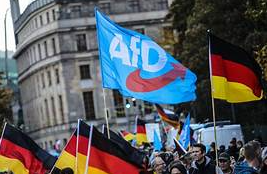The firewalls that prevent the country’s centrist parties from governing with the radical right and left are cracking.
The state elections in eastern Germany on 1 September delivered a strange result: the far right won, but the far left holds the balance of power. As happened in France in July, nobody wanted to partner with the far right, and the result is a mess.
This is the first time the far-right Alternative for Germany (AfD) party has won a state election. It secured more than 30 percent of the seats in two eastern German states. In Thuringia, it came first. In Saxony, it took second place behind the center-right Christian Democratic Union (CDU). The AfD is now the dominant political force in eastern Germany.
The polls predicted the result fairly accurately, and yet Germany is in shock. The far right is on the march, and no one knows how to stop them. The political crisis is being exacerbated by the fact that no party wants to form a coalition with the AfD, even though it has become the strongest force in the region.
This political paralysis is a reflection of a broader shift in Germany’s political landscape, where the traditional party system is being increasingly undermined by the rise of extremist movements. The long-standing firewalls that once prevented alliances between the centrist parties and the far right or far left are cracking, and there’s no clear path forward.
While the far right celebrates its success, the other parties are left in a state of confusion and fear. The country’s political elite is struggling to adapt to the new reality, where extremism is gaining ground. This situation puts immense pressure on Germany’s political cohesion and its ability to function effectively in the future.
The broader implications of this shift are already becoming apparent. The rise of the far right is reshaping Germany’s political priorities, and the vacuum left by the failure of traditional parties to govern is opening up space for more radical voices. Whether the country can rebuild a functioning and stable political system remains to be seen.
Ultimately, Germany is facing a political crisis of its own making. The forces that have allowed the far right to gain such power are deeply rooted in the country’s history and current challenges. Addressing this crisis will require political leaders to confront uncomfortable truths and find a way to restore trust in the democratic system.

